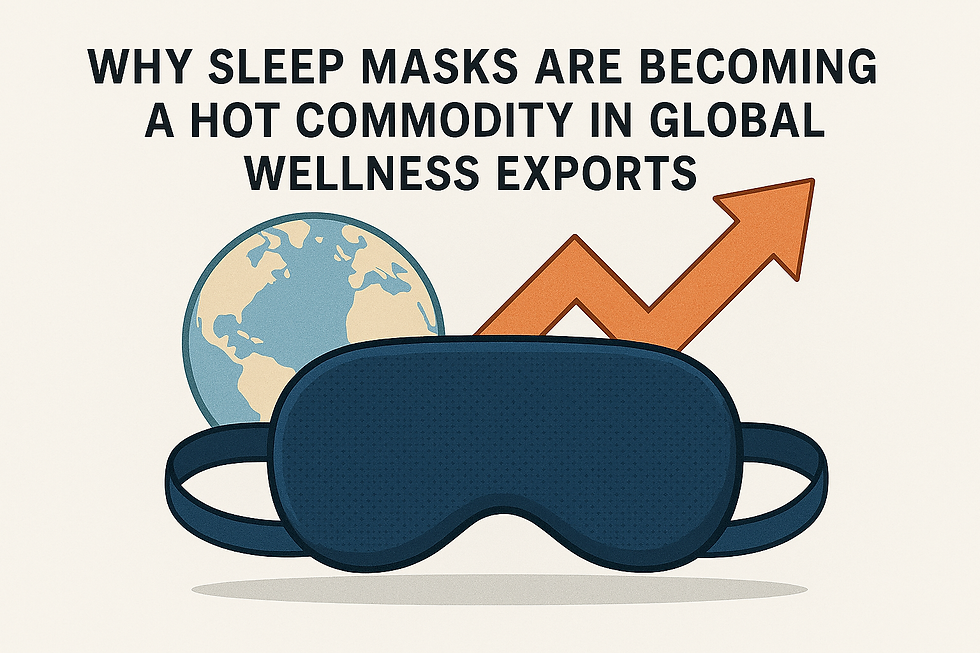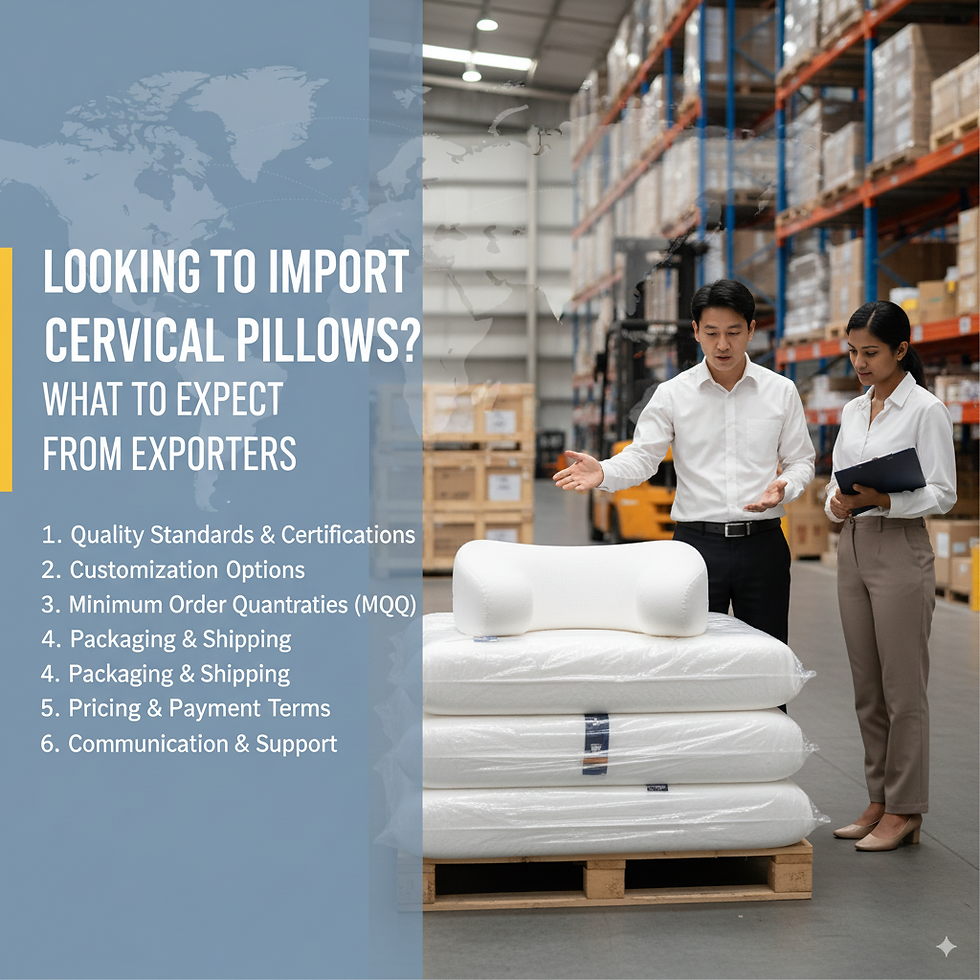Why Sleep Masks Are Becoming a Hot Commodity in Global Wellness Exports
- cdeastshore1
- Aug 18, 2025
- 5 min read

The global wellness industry, valued at over USD 5.6 trillion in 2024, continues to expand as consumers prioritize health, relaxation, and self-care. Within this booming market, sleep masks have emerged as a surprisingly hot commodity in global exports. Once considered a simple travel accessory, sleep masks are now a staple in wellness routines, driven by rising awareness of sleep health, innovative designs, and growing demand for sustainable products. In 2025, with sleep deprivation affecting nearly 35% of adults worldwide, exporters of sleep masks are capitalizing on this trend, catering to retailers, spas, and e-commerce platforms. This 1000-word blog explores why sleep masks are surging in global wellness exports and what makes them a lucrative opportunity for businesses.
The Rise of Sleep Health Awareness
Sleep health has become a global priority, fueled by research linking poor sleep to stress, reduced productivity, and chronic health issues like anxiety and heart disease. The World Health Organization estimates that sleep disorders cost economies billions annually in healthcare and lost productivity. As a result, consumers are investing in tools to improve sleep quality, with sleep masks leading the charge due to their affordability and effectiveness.
Sleep masks block light, a key disruptor of melatonin production, helping users fall asleep faster and achieve deeper rest. Studies show that light-blocking masks can improve sleep efficiency by up to 15%. This science-backed benefit has driven demand, with global searches for “sleep masks” rising by 40% from 2020 to 2024. Exporters are meeting this need by supplying masks to wellness-focused markets in North America, Europe, and Asia, where sleep health campaigns are gaining traction.
Innovative Designs Driving Market Appeal
Modern sleep masks go beyond basic fabric eye covers. Dedicated exporters are leveraging advanced materials and technologies to create products that resonate with wellness-conscious consumers. Features like memory foam padding, adjustable straps, and contoured designs ensure comfort and prevent pressure on eyes. Some masks incorporate cooling gels or aromatherapy elements, like lavender-infused fabrics, to enhance relaxation.
High-tech options are also gaining popularity. In 2025, smart sleep masks with built-in Bluetooth speakers or light therapy are trending, appealing to tech-savvy buyers. For example, masks that play white noise or guided meditations can improve sleep onset by 20%, according to sleep studies. Exporters in countries like China and South Korea, known for tech-driven manufacturing, are leading this innovation, shipping millions of units to global retailers.
Retailers benefit from this variety, as it allows them to cater to diverse customer segments—from budget-conscious travelers to luxury spa clients. The global sleep mask market, valued at USD 18.2 million in 2022, is projected to grow at a 4.5% CAGR through 2030, reflecting the impact of these innovations.
Sustainability as a Competitive Edge
Sustainability is a cornerstone of the wellness industry, and sleep mask exporters are aligning with this trend. Consumers increasingly demand eco-friendly products, with 60% of global shoppers prioritizing sustainable brands in 2024 surveys. Exporters are responding by using organic cotton, bamboo fabrics, and recycled polyester, which reduce environmental impact compared to synthetic materials.
Certifications like OEKO-TEX Standard 100 and GOTS (Global Organic Textile Standard) assure buyers of chemical-free, sustainable production. Some exporters incorporate biodegradable packaging or carbon-neutral shipping, appealing to retailers targeting eco-conscious markets like Europe and Australia. For instance, bamboo-based masks, which require 70% less water to produce than cotton, are a top export from Vietnam.
This focus on sustainability not only meets consumer expectations but also helps retailers avoid regulatory penalties, such as the EU’s eco-design requirements. By sourcing from sustainable exporters, retailers can boost brand loyalty and increase sales by 5-10% in eco-driven markets.
Affordability and Accessibility
Sleep masks are a low-cost entry point into the wellness market, making them highly accessible. Basic models retail for $5-$15, while premium smart masks range from $30-$100. This affordability broadens their appeal, from mass-market retailers like Walmart to luxury brands in department stores. Exporters, particularly in China and India, leverage economies of scale to offer competitive pricing, enabling retailers to maintain healthy margins.
Unlike expensive wellness products like massage chairs or high-end supplements, sleep masks require minimal investment, making them ideal for impulse purchases. E-commerce platforms report a 25% increase in sleep mask sales during holiday seasons, as they make popular gifts. Exporters with flexible minimum order quantities (MOQs) allow small retailers to test the market without overstocking, while large chains benefit from bulk pricing.
Robust Supply Chains for Global Reach
The global demand for sleep masks requires exporters with efficient supply chains. Leading exporters in China, Vietnam, and Turkey maintain diversified sourcing for raw materials like cotton and bamboo, mitigating risks from disruptions like trade tariffs or natural disasters. In 2025, with shipping costs stabilizing post-pandemic, exporters use strategic logistics hubs in Singapore and Dubai to ensure timely deliveries.
Retailers rely on exporters who can handle customs regulations and provide proper documentation, such as certificates of origin or compliance. Digital tracking systems allow real-time monitoring, reducing delays that could cost retailers 3-5% of revenue due to stockouts. For example, a dedicated exporter in China can deliver 10,000 units to the U.S. in 4-6 weeks, compared to 8 weeks from general textile suppliers.
Customization for Brand Differentiation
Customization is a key reason retailers prefer dedicated sleep mask exporters. These specialists offer tailored designs, such as branded logos, unique patterns, or specific colors, allowing retailers to differentiate in a crowded market. For instance, a spa chain might order lavender-scented masks with embroidered logos, while an airline could request lightweight masks with travel-themed designs.
Exporters provide tech packs and samples to ensure products meet retailer specifications. In 2025, personalization trends—like masks with adjustable light-blocking flaps or cooling inserts—are popular, and dedicated exporters can quickly adapt to these demands. This flexibility helps retailers stay ahead of trends, reducing inventory obsolescence risks that can cost up to 15% of profits.
Ethical Production and Consumer Trust
Ethical production is critical in the wellness industry, where consumers scrutinize labor practices. Dedicated exporters often comply with Fair Trade or BSCI (Business Social Compliance Initiative) standards, ensuring fair wages and safe working conditions. This is particularly important in countries like Bangladesh, where labor concerns are prevalent.
Retailers partnering with ethical exporters avoid reputational risks that could lead to boycotts or lost sales. Transparent supply chains, verified by third-party audits from SGS or Intertek, build consumer trust. Exporters who provide traceability—detailing sourcing and production—help retailers market their products as ethically sourced, a key driver of sales in 2025.
After-Sales Support and Market Insights
Dedicated exporters offer robust after-sales support, including warranties for defects and rapid response for quality issues. They provide care instructions and training for retailers to educate customers, reducing returns that can cost 8-10% of revenue. Some exporters offer digital platforms for order tracking and issue resolution, streamlining operations.
Their market expertise is another advantage. Dedicated exporters monitor trends, such as the rise of weighted sleep masks for anxiety relief, and share insights with retailers. This helps retailers stock trending products, boosting sales by aligning with consumer preferences.
How Retailers Can Select the Right Exporter
To choose a dedicated sleep mask exporter, verify certifications like OEKO-TEX and GOTS. Request samples to test quality and comfort. Check references from other retailers to confirm reliability and delivery performance. Conduct factory audits, either directly or through agents, to assess production and ethical standards.
Start with a trial order to evaluate responsiveness and product consistency. Negotiate clear contracts outlining pricing, MOQs, and penalties for delays. Prioritize exporters with global logistics experience to ensure smooth imports.
Conclusion
Sleep masks are a hot commodity in global wellness exports due to rising sleep health awareness, innovative designs, and sustainability trends. Dedicated exporters offer specialized expertise, eco-friendly production, and reliable supply chains, making them the preferred choice for retailers. By providing affordable, customizable, and ethically produced masks, they help retailers capitalize on a market growing at 4.5% CAGR. In 2025, partnering with a dedicated exporter ensures retailers meet consumer demands, enhance brand loyalty, and boost profitability. Choose wisely to ride the wave of this wellness trend.



Comments